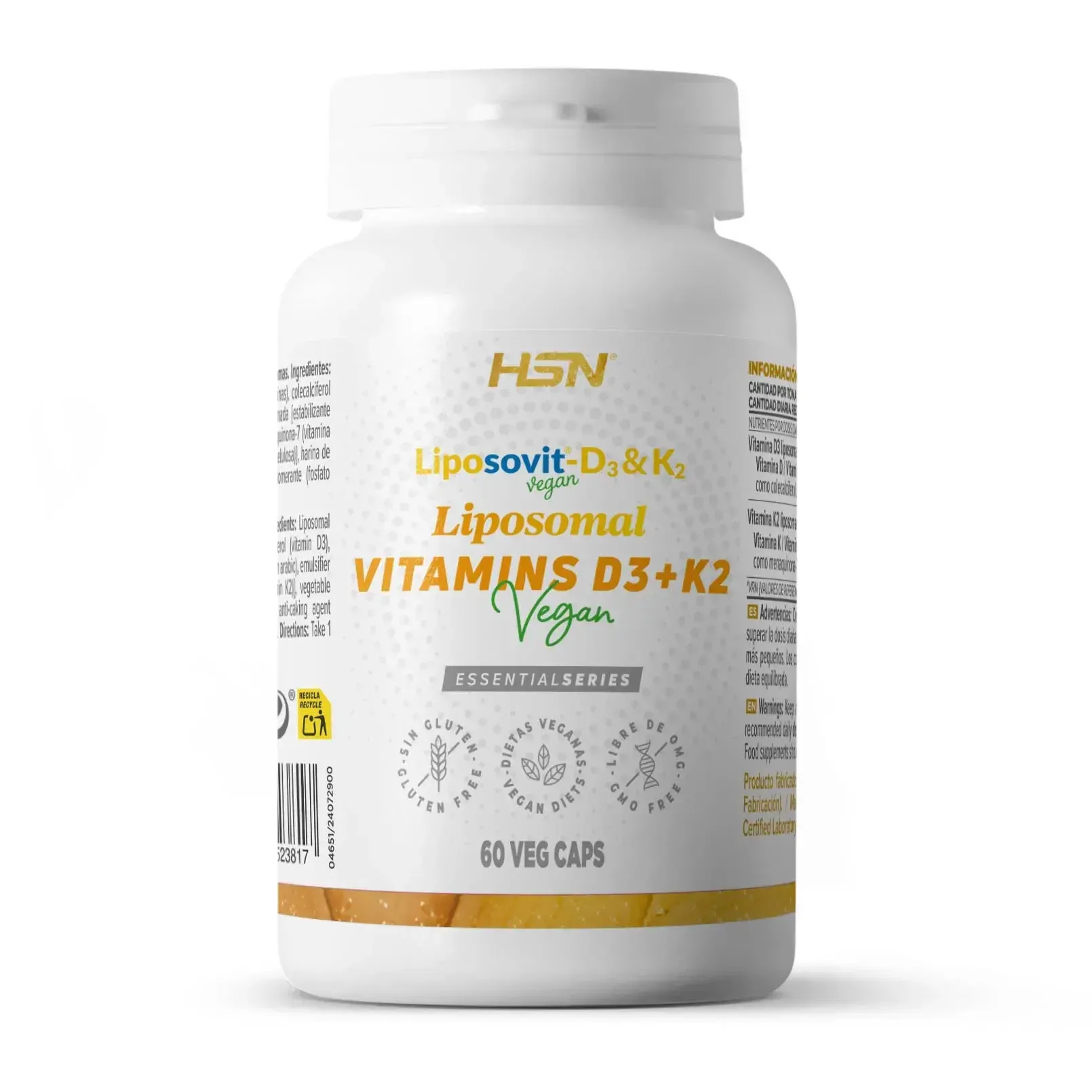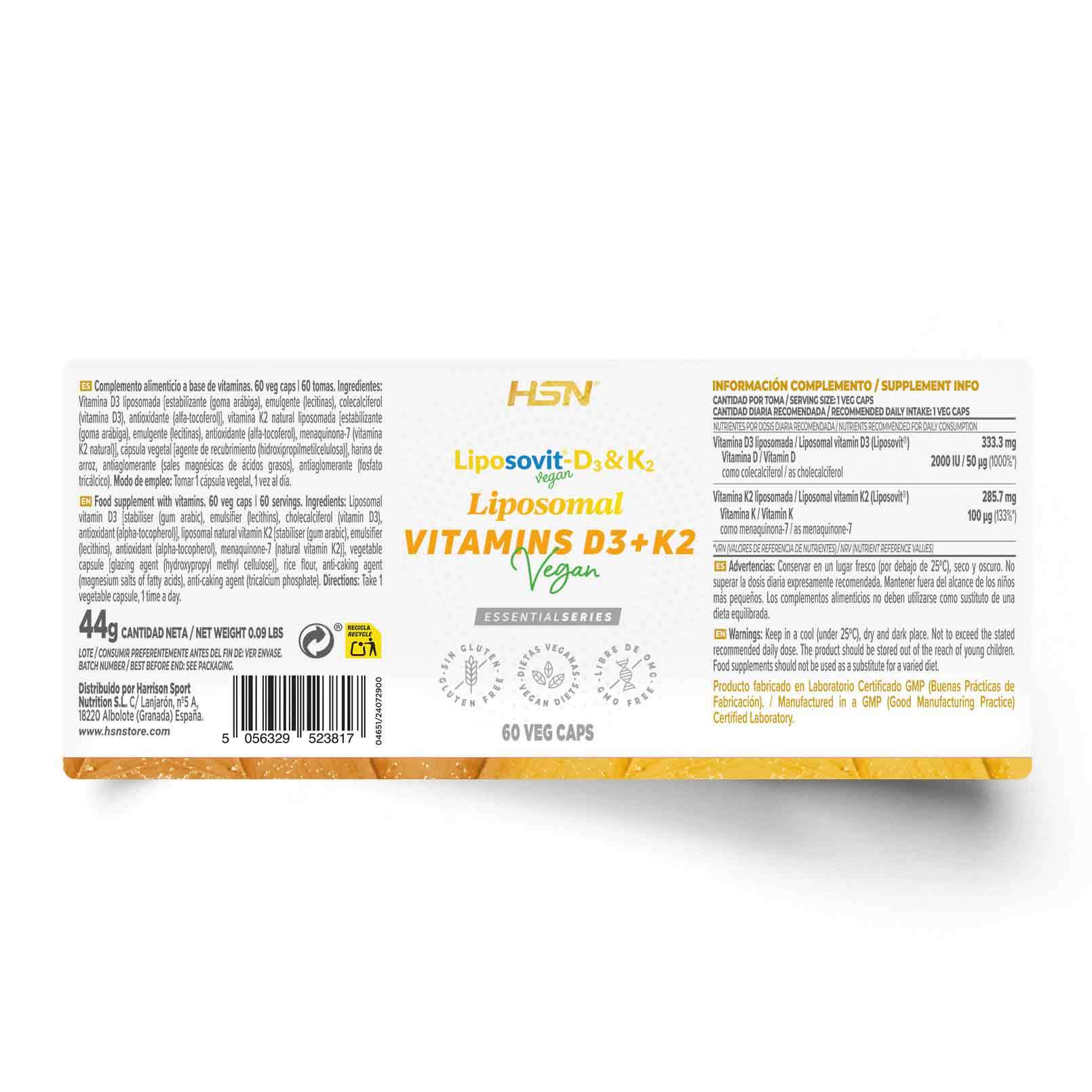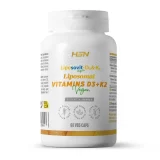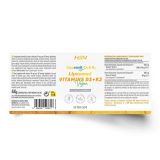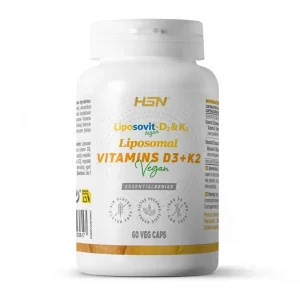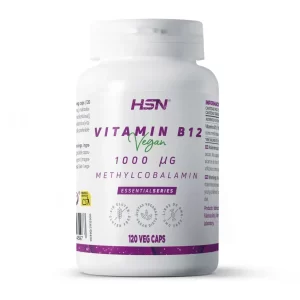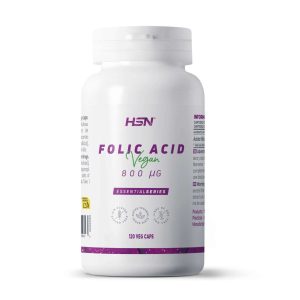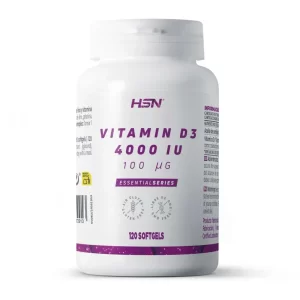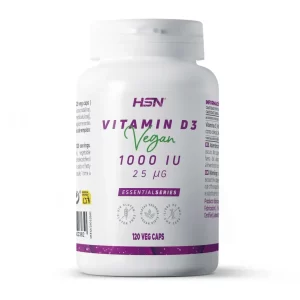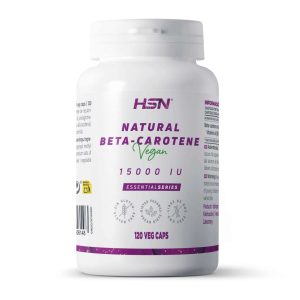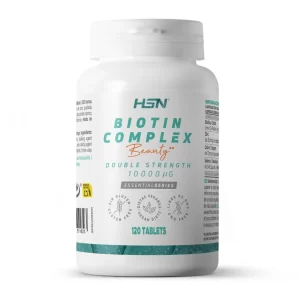- The best combination of vitamins! – D3 + K2 for your nutrition.
- Both from vegan sources: Vitamin D3 from lichen and Vitamin K2 without soy allergens.
- Liposomal presentation – Optimised bioavailability for maximum effectiveness.
- Raw material Liposovit® – The most internationally recognised patent.
- Vitamins protected by the intact liposomal wall – No degradation or loss of integrity.
- A vitamin combo ideal for bone health – Vitamins D and K contribute to the maintenance of normal bones.
- Liposomal vitamins with guarantees shelf life without refrigeration.
Classic combination: Vitamins D and K – Liposomal form
Vitamin D3 2000IU + K2 (100mcg Vitamin K) Liposomal (Liposovit®️) by EssentialSeries is a food supplement developed from the combination of two vitamins that are commonly used together: Vitamin D and Vitamin K, in the most bioavailable forms: Cholecalciferol and Menaquinone-7; with a liposomal treatment that ensures their stability.
‘Liposoming’ a nutrient involves encapsulating it in spherical structures coated with phospholipids in a lipid bilayer, creating an aqueous interior and a fatty wall. This allows both hydrophilic and lipophilic nutrients (as is the case with these vitamins) to be adequately protected.
The choice of raw material for these vitamins has been selected due to its guarantees of quality, stability, and integrity, as well as the vegan and hypoallergenic origin of the nutrients, making our product a valid option for all users.
HSN committed to quality. See for yourself
Patent: Liposovit® – Recognised as the best option
Liposovit® is a registered patent by Bart, a Polish laboratory renowned for its efforts in developing liposomal nutrients. Bart has created a unique patented liposomal system, positioning it as a reference in the field.

The details of this system are protected by the Liposovit® patent, but we know from internal research that there is no better option when it comes to liposomals because:
- During the liposomal process, the liposomes generated have an ideal size and structural integrity.
- Liposomal nutrients do not require cold storage, they remain stable at room temperature.
- No GMOs or genetically modified elements are used, unlike some other raw materials.
- They offer plant-based nutrient options – For example, vitamin D, which is usually sourced from lanolin, is derived from lichen in this case.
Developed with intact liposomes, maximum protection for vitamins
One of the major challenges with vitamins, or any other liposomal nutrient, is that the state of the liposomes is crucial to their effectiveness. Since liposomes are the reason why vitamins are ‘protected’, if the liposomes break, they lose their function.
Bart guarantees the integrity of the liposomes in its Liposovit® patent.
Cheaper raw materials for liposomal nutrients lack the tools to guarantee this. Many can only ensure that a certain percentage of the liposomes remain intact at the time of development, but not their durability over time.
Bart has been working with liposomal nutrients for years, allowing them to thoroughly study how they best behave in terms of durability, thus guaranteeing the integrity of their ‘somas’ during the storage and usage period indicated on the product.
Intact preservation without the need for refrigeration
A major advantage of Liposovit® raw materials over other liposomal nutrients is that they do not require cold storage. Other liposomal vitamins, known for their high quality, often specify the need for a cold chain.
Maintaining a cold chain is always delicate and prone to issues, from raw material deliveries, factory handling, distribution, and of course, home storage by the user. It also significantly increases product costs.
Liposovit®, unlike other patents, does not require refrigeration, but unlike some manufacturers that avoid recommending refrigeration just to facilitate purchases, Liposovit® ensures that liposomes are properly preserved at room temperature. Its appropriate storage is indeed at room temperature.
Adjusted dosage for optimal results – 50mcg/2000IU (Vit D) + 100mcg (Vit K)
It’s important to know the dosage of the vitamins you use, as some options like vitamin D can vary widely in dosing.
For example, in the ‘Vitamin D’ section of our catalogue, you’ll find vitamin D products with doses ranging from 1000IU to 50000IU.
For our food supplement, we have used a balanced dose of both vitamins, making it suitable for both people who only need some extra support and those seeking specific properties and functions from these vitamins:
- Vitamin D: 50mcg = 2000IU.
- Vitamin K: 100mcg.
100% Vegan – Lichen-based Vitamin D3 – Allergen-free Vitamin K
Vitamins can be sourced from various places, and both Vitamin D and Vitamin K come with certain considerations.
On the one hand: Vitamin D3 is usually sourced from lanolin; lanolin is a type of greasy secretion from sheep’s wool, which is very rich in vitamin D. However, this poses an ethical dilemma for strict vegetarians. In our case, we use vitamin D3 sourced from lichen, a completely safe microorganism, from which high-purity vitamin D can be extracted, without ethical implications for vegans.
On the other hand: Vitamin K2, especially menaquinone with a 7-carbon chain (MK-7), is obtained from fermented soybeans, which poses a problem for those with soy allergies, as many can’t use soy-based vitamin K products. Our liposomal Vitamin K is allergen-free.
A vitamin blend packed with benefits
Both vitamin D and Vitamin K are essential nutrients for humans, as our bodies cannot produce them on their own. Despite the fact that the sun helps synthesise vitamin D in the human body, it’s considered that the general population’s exposure is insufficient to meet the required amounts, making it ‘essential’.
The main use of vitamins D and K relates to bone health, as both vitamins contribute to the maintenance of normal bones.
Other interesting benefits include:
- Vitamin K contributes to normal blood clotting.
- Vitamin D contributes to normal absorption/utilisation of calcium and phosphorus.
- Vitamin D contributes to the normal function of the immune system.
K2-MK7 / Cholecalciferol (D3). Optimal forms!
When talking about vitamins, you may come across different types of the same vitamin, and although they are all valid, there are functional preferences that nutritionists and other nutrition professionals have mentioned on numerous occasions.
On the one hand: Vitamin K in the form of menaquinone (K2) is preferable to the form of phylloquinone (K1):
- Schurgers, L. J., Teunissen, K. J. F., Hamulyák, K., Knapen, M. H. J., Vik, H., & Vermeer, C. (2007). Vitamin K-containing dietary supplements: Comparison of synthetic vitamin K1 and natto-derived menaquinone-7. Blood, 109(8), 3279–3283.
And among all the subtypes of Vitamin K2, MK-7 (menaquinone-7) is the most recommended:
- Sato, T., Schurgers, L. J., & Uenishi, K. (2012). Comparison of menaquinone-4 and menaquinone-7 bioavailability in healthy women. Nutrition Journal, 11(1), 93.
On the other hand, in comparative studies between cholecalciferol (D3) and ergocalciferol (D2), D3 has been the clear winner:
- Tripkovic, L., Lambert, H., Hart, K., Smith, C. P., Bucca, G., Penson, S., … Lanham-New, S. (2012). Comparison of vitamin D2 and vitamin D3 supplementation in raising serum 25-hydroxyvitamin D status: A systematic review and meta-analysis. American Journal of Clinical Nutrition, 95(6), 1357–1364.
At HSN, we use Vitamin K2-MK7 and Vitamin D3 because they are the best options for developing our liposomal product.
Let us help you choose: Liposomal or Standard Version?
Liposomal vitamins are an optimised version of their standard counterparts, but that doesn’t mean non-liposomal forms aren’t effective.
Both options are good recommendations to complement your diet with an ‘extra’ boost of one or more vitamins. However, due to the additional advantages liposomalisation offers, it is considered a superior option. If you’re still unsure which to use, here’s a recommendation:
- If you’re just looking for a slight extra boost, or you’re using other products with the vitamin (like multivitamins), you can go for the standard option.
- If you’re using the vitamin for a specific reason, or your diet is particularly lacking in this vitamin (or you get no sunlight for Vitamin D), it’s better to use the liposomal version.
Bibliographical references
- Gopi, S., & Balakrishnan, P. (2021). Evaluation and clinical comparison studies on liposomal and non-liposomal ascorbic acid (vitamin C) and their enhanced bioavailability. Journal of Liposome Research, 31(4), 356–364.
- Mladěnka, P., Macáková, K., Kujovská Krčmová, L., Javorská, L., Mrštná, K., Carazo, A., … Nováková, L. (2022). Vitamin K – sources, physiological role, kinetics, deficiency, detection, therapeutic use, and toxicity. Nutrition Reviews, 80(4), 677–698.
- Davis, J. L., Paris, H. L., Beals, J. W., Binns, S. E., Giordano, G. R., Scalzo, R. L., … Bell, C. (2016). Liposomal-encapsulated ascorbic acid: Influence on vitamin C bioavailability and capacity to protect against ischemia-reperfusion injury. Nutrition and Metabolic Insights, 9, 25–30.
- Shea, M. K., & Booth, S. L. (2022). Vitamin K. Advances in Nutrition, 13(1), 350–351.
- Simes, D. C., Viegas, C. S. B., Araújo, N., & Marreiros, C. (2020). Vitamin K as a diet supplement with impact in human health: Current evidence in age-related diseases. Nutrients, 12(1).
- Nair, R., & Maseeh, A. (2012). Vitamin D: The sunshine vitamin. Journal of Pharmacology and Pharmacotherapeutics, 3(2), 118–126.
- DiNicolantonio, J. J., Bhutani, J., & O’Keefe, J. H. (2015). The health benefits of Vitamin K. Open Heart, 2(1), e000300.

